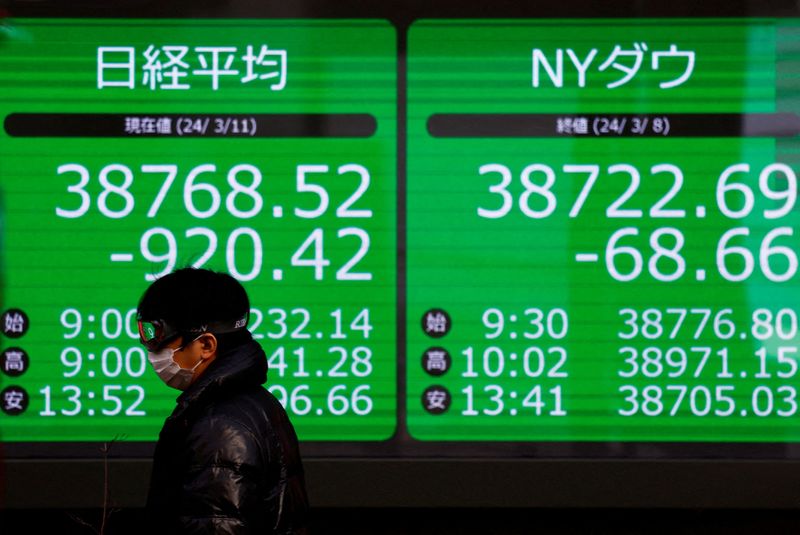By Kevin Buckland
TOKYO (Reuters) - Japan's Nikkei share average hit a record high on Thursday and the yen rebounded from a four-month low, after the U.S. Federal Reserve stuck to its easing path despite recent heated inflation readings.
The Fed's policy direction contrasts sharply with the Bank of Japan, which on Tuesday ended eight years of extraordinary stimulus measures with its first rate hike since 2007.
However, BOJ Governor Kazuo Ueda reiterated that policy would remain broadly accommodative for the time being, in comments to parliament on Thursday.
Japanese government bond yields ticked higher amid expectations for tighter policy.
The Nikkei marked a record closing high of 40,815.66, up more than 2% on the day, after also setting a fresh all-time intraday peak of 40,823.32. For the year, it is up 22%, far outpacing an 8% advance for the MSCI world index.
The dollar was last down 0.2% at 150.94 yen, after scaling 151.82 yen on Tuesday for the first time since mid-November.
The BOJ and Fed policy announcements have given investors the green light to buy stocks again, said Yunosuke Ikeda, Nomura's chief equity strategist, based on the same three underlying catalysts that drove gains for the past year: better corporate governance, emergence from deflation, and concerns about China that have drawn money into Japan.
"These factors are evolving somewhat, but basically continuing from last year."
While the Fed's signal that it is still on track for three quarter-point rate cuts this year puts it on the opposite path from the BOJ, Japanese policymakers have stressed that any further tightening would be very gradual.
The BOJ sees room for another hike this year, with market players viewing July or October as potential dates, the Nikkei newspaper reported.
"It's too early to say there's a risk of a July hike", which would require sustained yen weakness despite Fed rate cuts and possible Japanese forex market intervention, forcing the BOJ to act, said Shusuke Yamada, chief Japan forex and rates strategist at Bank of America.
In the medium term, dollar-yen could fall to 145 or lower if BOJ hikes coincided with Fed cuts, he said.
However, demand for carry in the currency pair is likely to spur dip buying, which could see a rise to 152, which is the level when traders may become wary of intervention, he said.
On Thursday, Japanese Finance Minister Shunichi Suzuki warned that the government was watching currency moves with "a high sense of urgency," but made no comment on currency intervention.
In the JGB market, two-year yields rose 2.5 basis points (bps) to 0.185%, rebounding from Tuesday's two-week low, while five-year yields added 3 bps to 0.385%, climbing from a three-week trough.
Japanese markets were closed for a national holiday on Wednesday.
The 10-year JGB yield rose 1.5 bps to 0.74%. The 20-year yield ticked up 1 bp to 1.505% and the 30-year yield edged 0.5 bp higher to 1.805%.
"Some people are trying to take account of the risk of early action by the BOJ, which will keep the short end under pressure," said Masayuki Kichikawa, chief Japan macro strategist at Sumitomo Mitsui (NYSE:SMFG) DS Asset Management.

But he warned against reading too much into market moves so soon after the BOJ meeting.
"We're in some kind of transition period, and everyone needs to get used to the new environment."